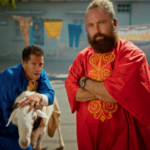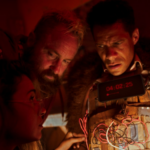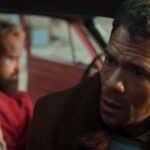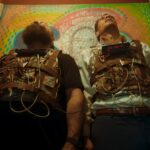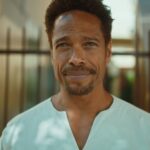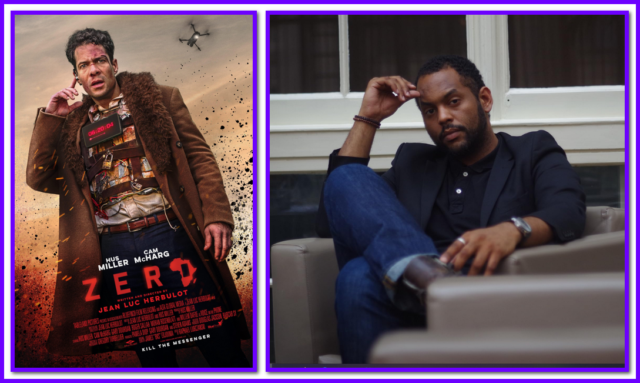
An enlightening in-depth exclusive interview with Congolese writer/director JEAN LUC HERBULOT discussing the philosophical, thought-provoking, profound, and action-packed ZERO.
SYNOPSIS: Two strangers searching for purpose in Dakar, Senegal, wake up with bombs strapped to their chests, counting down from ten hours. Controlled by a mysterious voice, they must complete a series of chaotic missions with devastating consequences. As the city erupts in protest against Western influence, the reluctant partners race for redemption. ZERO is a thrilling, darkly humorous tale of survival, connection, and the human search for meaning.
Directed by JEAN LUC HERBULOT and co-written by Herbolut and Hus Miller, ZERO stars Hus Miller, Cam McHarg, and Gary Dourdan, with “the voice” courtesy of Willem Dafoe.
If ZERO is an example of new African cinema, then I say, bring on more. If JEAN LUC HERBULOT is one of the filmmakers leading that charge, I say, make more films Jean Luc. ZERO is one of the most striking and engaging films to come around in a long while. A philosophical action thriller set in and shot in Senegal, ZERO contrasts vibrant Senegalese life with a protagonist strapped with a bomb, exploring themes of life and death, reincarnation, and the dual forces of violence and money. Enthusiastic, articulate, and charming, in this exclusive interview, Jean Luc explains the film’s inception. Inspired by a limited budget and a desire to capture Senegal’s color and energy, he emphasizes the film’s layered narrative, including the emotional core of the characters and the philosophical concept of ZERO, and how the cinematography and editing techniques enhance the story’s impact.
As Jean Luc explains, the development of ZERO started when two American actors approached him about making a movie with a limited budget. Initially, he was shooting another film in Senegal and invited the actors to see the production potential in West Africa. The original concept was simple: two Americans waking up in Dakar with bomb straps on their chests and a 10-hour countdown. When Jean Luc pitched this to his producer, the producer was immediately intrigued. However, Jean Luc emphasized that beyond the action concept, he wanted to explore the emotional depth – asking what someone would say in their final moments to a child they’ve never met. The philosophical concept of ZERO then evolved, exploring ideas of reset, balance, and the potential of a mysterious voice (like a god) manipulating characters to restore equilibrium. The film became a layered exploration of power, domination, and chaos, represented through the two main characters symbolizing economic force and military violence. Going against the grain and the idea of mass marketing ability for a film, Jean Luc intentionally created a concept that would be hard to market – not strictly an action film, political thriller, or comedy, but a multi-layered story with deep philosophical and spiritual undertones.
Those philosophical and spiritual undertones all revolve around power, domination, reset, and the complex dynamics between life and death, elements that feed into Jean Luc’s interest in exploring how different societies handle systems of control, colonialism, and post-colonial tensions. Using characters, Man #1, Man #2, and Daniel, as metaphors for economic and military forces, the spiritual element of having an unseen “voice” orchestrating events also intrigues Jean Luc, potentially allowing exploration of how external forces impact individual human journeys. If you’re looking for a film with layered narratives that appear simple on the surface but contain deep philosophical and social commentary, ZERO is the film for you.
Humor was crucial in the film to help cope with serious themes of death and tension. As Jean Luc discusses, when dealing with heavy subjects like war and death, humor becomes a natural survival mechanism. There is one scene in the third act that features Gary Dourdan as “Daniel” and involves a big horned ram. An improvisation by Dourdan, putting his finger in the goat’s mouth to calm it, added unexpected comedy to an intense situation. Something that Jean Luc has observed is that people often start living more intensely when faced with potential death, and humor is a key part of that human response. The humor helps balance the film’s philosophical and action elements, preventing the narrative from becoming too dark or oppressive.
As with the film’s themes, Jean Luc’s visual approach to ZERO was deeply intentional. For the two main characters representing money and violence, he deliberately used different visual styles: for the first character, he used L-camera shots, while for the second character, he used steady shots. When the characters are together, he used static camera work. Hand in hand with the differing visual styles is the film’s color palette. Carefully chosen to avoid the typical “hot country” yellow-orange tones and to showcase the vibrancy of life, particularly in the traditional and urban areas of Dakar, Gregory Turbellier’s cinematography focused on unique light of Senegal, with its white sky and intense sunlight, speaking to the contrast between life and death, with the light and color changing significantly in different locations. The lack of clouds in Dakar’s sky was even interpreted as a metaphorical representation of the omnipotent “voice” watching over the characters. The drone shots were designed to create a sense of scale, making the characters look like small pieces being moved around by a higher power, which ties into the film’s philosophical themes of control and randomness. The color grading was a deliberate artistic choice to make the visual experience rich and meaningful, moving beyond stereotypical representations of African locations.
As if Jean Luc’s cinematic structure and thematic design wasn’t challenging enough, the key challenge was intentionally breaking time and disrupting audience expectations. He wanted to create unpredictability by alternating between fast-paced sequences and sudden pauses. For example, in scenes like a car sequence in Los Angeles, he used long, uncut shots to challenge the typical high-octane action movie style. As he explains, his goal was to make the audience feel like they weren’t in control, mirroring the characters’ experiences. By strategically slowing down moments and keeping viewers off-balance, he could insert philosophical and contemplative elements without losing the film’s energy. Raphael Lubczanski’s editing was designed to constantly play with the audience’s assumptions about what type of movie they were watching.
And all of this is just the tip of the iceberg in our exclusive conversation.
TAKE A LISTEN. . .
by debbie elias, exclusive interview 04/03/2025
ZERO is now in theatres and available on VOD.

